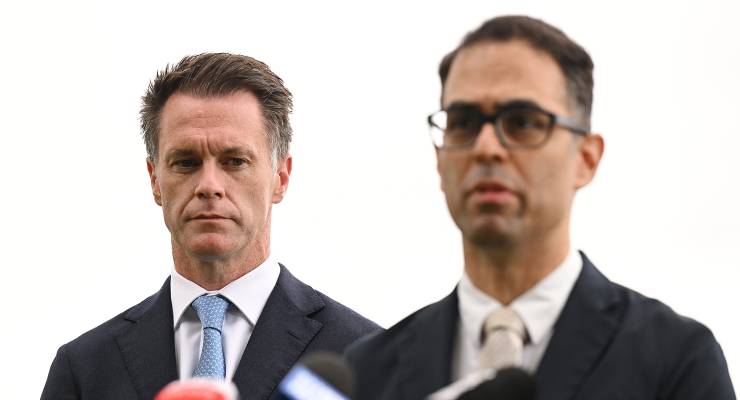
If there are two groups you don’t want to be south of on your first state budget after making massive promises, public sector unions and people driving commercial vehicles seem to be the ones.
In a forerunner to Tuesday’s first real post-COVID NSW state budget — in actuality, just a post-win level-setter, like the first Chalmers budget — the great artifice of instantaneous promise deliverance is on full show, not least to pay back short-term loans to Trades Hall at Haymarket.
It is, in many ways, a necessary bit of industrial ceremony before the teeth start flying on the way to proper NSW public-service-wide bargaining that the new government is hoping for in around a year’s time.
Several short-term, top-up, catch-up and they-just-stuffed-up deals are now being made across the NSW public service to keep up appearances. But Labor has a major internal talent deficit, not at the elected representative level but among advisers, because it has wall-to-wall government everywhere except Tasmania. It’s a seller’s market.
While all four immediately previous premiers (“Boffa”, Baird, Berejiklian and Perrottet-with-a-P-not-a-B) routinely reminded Canberra it is but a merely tolerated federalist barnacle upon Australia’s first and most powerful state, Minns must walk the tightrope between factional and local support and rules in a minority.
This is not an intrinsically bad thing. NSW has longer locked-in terms of government than Canberra and these have provided for stability. The previous Coalition government was also far more literally liberal and progressive than arguably the last Labor government, which allowed perennially internecine rivalries to define it.
Berejiklian and John Barilaro have nothing on the capture of Eddie Obeid by the state’s right faction. Putting Gladys side by side with Michael Costa and Crows Nest on Sydney’s North Shore looks like a Trotskyist enclave by comparison.
Where the former NSW government really screwed over incoming Labor was on public transport. When Labor left government last in NSW there was a legacy of drift, underinvestment and can-kicking exemplified by RailCorp trying to shut down TripView. (Yep, a state agency actually tried to legally remove access to timetable data from app developers on the basis it was intellectual property that someone had dared to digitise.)
Former NSW premier Nathan Rees sniffed the wind and moved the furniture away from the fire. That was almost 15 years ago, but the public perception of factional interests coming before those of the public is still seared deep into the travelling psyche.
There are still another three years of infrastructure upgrades the now state opposition can claim credit for when opened and decry when cancelled.
Small wonder NSW Treasurer Mookhey and friends are feverishly capping tolls on roads at $60 per week and pointing to $3.6 billion in reserved public service payrise spending, while keeping their powder dry on issues like finishing the giant Sydney Metro expansion to the city’s west.
The Sydney Metro is a once-in-a-century infrastructure duplication, as are many public transport projects in the state. Travel times between adjoining cities (Wollongong, Newcastle, Katoomba and the Southern Highlands) still sit below where they were several decades ago.
The previous government had many faults, but in the broad effectively communicated the need for positive reform, especially on infrastructure. It also stood up to Canberra’s often ideologically driven idiocies, like denial of alternative energy sources.
NSW may have longer terms than Canberra, but if satisfaction levels drop off at Service NSW, this will be the litmus test for Minns irrespective of what party-commissioned focus groups are saying.
The previous NSW government showed they could be bigger than Canberra and often were. Victoria has always called its own race, as has Queensland. Minns and Mookhey still have some work to do defining what they intend to do on the other side of opposition.
If that means not reconstructing things that already work well, like Service NSW, admit it and build upon it.
People expect and accommodate change in the political cycle. They are far less forgiving of degradation of services and this is not defined by funding alone.
This article was republished from The Mandarin.








You are kidding surely? The LNP clown in NSW have a record of massive cost overruns, privatising roads to the benefit of a single company, massive rolling stock failiures, funneling traffic deliberatley to transurban toll roads, ferries that can’t cross the harbour, river ferries that don’t fir the bridges, trains that didn’t fit the tunnel. A complete cock up in the removal of multi deck carriages is nbext and the completley umnwareanted remoival of a heavy railsurvice that worked for a metro that will be slower and carry less. But wait…the cost has trebled, the books were cooked by the previous premier with his transport holding company scam and the finances were clealry up the creek. A littl more honesty from tyhe media and a little less lauding of the achievements of a totally bent government.
“The previous Coalition government was also far more literally liberal and progressive than arguably the last Labor government, which allowed perennially internecine rivalries to define it.”
I think this is over-reach. What has factional rivalry got to do with whether a political party is liberal or progressive? It may have something to do with competence and stability but these are not hallmarks of liberalism and progressivism. And the previous coalition government was as bad as the Morrison-Turnbull-Abbot coalition Federal regimes. We now have a State run entirely by Transurban. That’s right. Tolls are everywhere because public transport is cumbersome, expensive, unreliable, infrequent and in some cases non-existent. Northern Beaches anyone? South west Sydney anyone? We have had health and education crises due to lack of adequate and targeted expenditure.
You need to brush up.
“Putting Gladys side by side with Michael Costa and Crows Nest on Sydney’s North Shore looks like a Trotskyist enclave by comparison.”
Now that clearly doesn’t make sense.
“The previous government had many faults, but in the broad effectively communicated the need for positive reform, especially on infrastructure.”
I’m sorry, you’ve really lost me here. What infrastructure? What reform? Ferries that can’t accommodate going under bridges?! New stadia that need to be demolished and rebuilt to win votes with boofheads? Metro rail with metro trains that are single deck, have smaller seats, are uncomfortable to ride in, are driverless, run underground from commuter stations often in the middle of nowhere which have commuter carparks which are usually full – Rouse Hill and surrounding stations? What about Light rail? Total disaster. Accidents with pedestrians and road vehicles all the time. Compete with them in fact. May as well have upgraded the dreaded Brereton “monorail”. They’ve totally screwed Newcastle with them. This State Government hates public transport and especially trains. Infrastructure is what it has done worst.
You are either jesting or having a go at us.